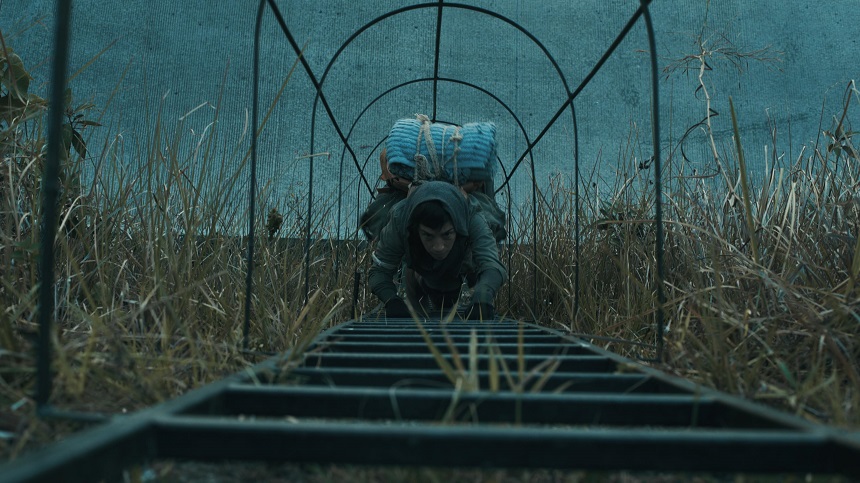Review: THE EYE AND THE WALL, Poignant Now, And Sadly, Probably Forever

Somewhere in Latin America, in the late 2030’s, Gabhán City has fallen to an oppressive and totalitarian regime under rule of The Eye. The inhabitants live in poverty and the city is confined by a tall imposing wall. Young Alba is a member of an underground network providing hospital care, food and water amongst the most needy. Lucre has been trying to convince Alba to leave Gabhán City, led by illegal smugglers crossing people to the other side of the wall. Alba’s boyfriend, Abdel, has stolen information that would expose The Eye and could topple this oppressive regime. With local authorities closing in, every moment Alba waits is a moment she could be caught.
The African proverb goes, ‘It takes a village to raise a child’. What if that village wants to set that child free? And if freedom were offered to you but it meant that you would be separated from the ones you cared about, would you take it? These are the questions posed by Guatemalan director Javier Del Cid in his sci-fi drama The Eye and The Wall (El Ojo et el Muro). His film opens with the dedication, En honor a todos los inmigrantes latinoamericanos. In honor of all latinamerican immigrants. If there are any questions as to why Del Cid has made this film, here is your answer.
The mention of sci-fi may invoke expectations of future worlds and big visual effects, so let us go through this first. Consider the world of The Eye and The Wall to be one in the near future. Also, because we’re watching a story about the world of the oppressed living under extreme conditions, no one has the latest technology in their pockets. What they have is cobbled together from scrap and there are more important things to get, like food, water and medicine. Smartphones be damned, they just need some antibiotics for their makeshift hospital.
We don’t ask that you temper your expectations but perhaps go in with the understanding that Guatemala is not a hotbed for science fiction cinema. The Eye and The Wall is only the third sci-fi film to be made in Guatemala, ever. With limited resources and a small budget, Del Cid makes due. Whille the film opens with impressive aerial shots of the forbidding wall against the slums in the foreground, there are things like the costume design for the regime and the effects when the Great Lady ‘talks’ with The Eye that give the impression they were heavily influenced by cable network syndicated series from North America. Del Cid has done the best that he can with the budget and resources available to him, even having to outsource parts of production to a handful of other countries with the tools he does not have in Guatemala.
We believe that Del Cid would rather you talk about his film in a thematic sense rather than dwell on its grassroots and indie film execution. Sadly, a drama film with sci-fi elements made two years ago, in response to the migrant crisis, still bears as much relevance as it did then, today and tomorrow. The irony that such a film is made in Guatemala is not lost, as Guatemala has acted at times as a sort of gatekeeper against migrant convoys trying to make their way into Mexico.
Few films like The Eye and The Wall show us what happens before someone tries to flee their home country. Few show us what causes a person to want to leave and what it takes, how many it takes, to help that person leave. Del Cid does a worthy job of creating an oppressed society, a world of dwindling resources, hard times and hard choices. He also does not swerve away from talking about those who look to take advantage of those looking to escape. A man called German is helping people get across the border but it comes at an unsettling cost. Then there is an emotional kick once Alba is convinced that she must leave. Del Cid pauses so that we may watch those who have sent Alba off break down: in anguish, in relief, both. A couple of these and you understand the toll it takes when someone decides they have to leave.
Sci-fi appears to be an appropriate genre in which to present this kind of story. A lot of the time, sci-fi creates utopian worlds for us that are free from persecution, social imbalances, totalitarian regimes and the like. If such worlds exist, heroes rise to topple them or are enlightened enough to know that such oppression is wrong and progress only happens when everyone is free. Popular sci-fi does this a lot. Del Cid hasn’t resigned himself to this, but we feel that he fears one thing.
Sadly, the specter of real life hangs over a film like The Eye and The Wall and will likely continue to do so. Our attention at the time of writing this review has been diverted away from Latin America, though the ending of Title 42 looms, and now to Europe and the migrant crisis caused by war over there. Science fiction has always wished that we are able to rise above such crises, that humanity can do better, and is capable of doing better.
For the time being, it seems that all we are capable of doing is keeping a film like The Eye and The Wall forever relevant to our current and future times.

Do you feel this content is inappropriate or infringes upon your rights? Click here to report it, or see our DMCA policy.






